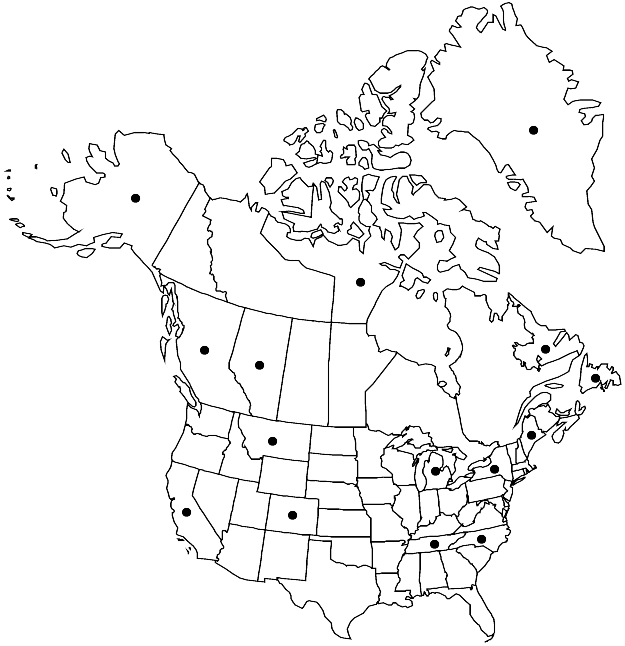Mielichhoferia elongata
in C. G. D. Nees et al., Bryol. Germ. 2(2): 186. 1831.
Plants small to medium-sized, whitish pale green, somewhat glossy. Leaves erect to ± spreading, 0.5–1.1 mm; distal medial laminal cells rhomboidal, 50–100 µm, walls thin. Specialized asexual reproduction absent. Sexual condition dioicous. Capsule erect or inclined to 20°; peristome double; exostome present; endostome basal membrane rudimentary, adherent to exostome teeth, segments absent. Spores 15–22 µm, roughened.
Phenology: Capsules mature spring (Apr–Jun).
Habitat: Rock, soil, substrates naturally enriched with heavy metals, mine tailings
Elevation: low to high elevations
Distribution

Greenland, Alta., B.C., Nfld. and Labr., Nunavut, Alaska, Calif., Colo., Maine, Mich., Mont., N.Y., N.C., Tenn., Europe, Asia.
Discussion
Mielichhoferia elongata grows in dense, compact turfs with a whitish or sometimes bluish color that makes this species easily recognizable. The laminal cells are thin-walled, giving the plants a softer texture than M. mielichhoferiana. The species might be mistaken for Pohlia, but the turfs are usually more compact and the plants are smaller; when fertile, the gametangial buds are lateral and the sporophytes are erect or nearly so. There is substantial variation in development of the exostome teeth, but North American plants have relatively long, rather coarsely papillose segments.
Mielichhoferia elongata is one of the copper mosses because it often grows on mineral enriched substrates, although not always with copper. Like other copper mosses, M. elongata has a broad and highly disjunctive geographic range but is nowhere common. In North America, the species is most frequent in the Rocky Mountains of Colorado, where it occurs on mine tailings, especially around the towns of Ouray and Silverton in San Juan County. Two morphologically cryptic lineages can be distinguished by genetic markers within M. elongata, and both occur in Colorado.
Selected References
None.